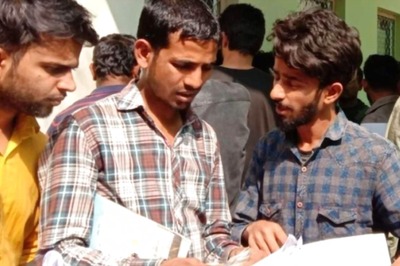
views
New Delhi: The Supreme Court on Tuesday laid emphasis on "propriety of public offices" and favoured a specific mechanism to investigate into sudden rise in assets of MPs and MLAs after they are elected.
A bench, led by Justice J Chelameswar, said that it would be appropriate to put in place a definite procedure to inquire into and take follow-up action after spurt in assets of MPs and MLAs is noticed by the Income Tax department.
It also questioned whether it was proper for politicians to get into commercial business. "We understand there will be actions by the I-T department, but the scope of inquiry under the Representation of People Act is in the sense of propriety of holders of public offices," observed the bench.
The court was hearing final arguments of a PIL, which wants a mechanism for investigation as soon as MPs and MLAs show their assets in I-T returns when the value of assets is found to be much more than what was disclosed in their election affidavits.
Assisting the court, Attorney General KK Venugopal said that while the intent of the bench is laudable, the disclosure of assets and their sources could remain immune under various laws and also as a right to privacy.
But the bench was not impressed. "Even the right to privacy is not absolute... like any other right. We may deal with it on a case to case basis. Every right is qualified and there could be compelling public interest in many instances," retorted the bench.
It added: "You (Venugopal) are showing us the schedule in which I-T department is immune and we understand the rationale. But when the information relates to those who want to occupy public offices, the question is whether they should claim immunity."
The A-G replied that the I-T department is serious about the whole issue and the affidavit filed a day ago by the department would corroborate that many MPs and MLAs are being probed for disproportionate assets.
The affidavit had said that assets of seven Lok Sabha MPs and 98 MLAs are under scanner.
The court, however, said: "You say the presumption is that I-T will act objectively, but the records of this court and especially the Vohra Committee report indicated that the cases against MPs and MLAs just don't progress. Is it not time that we say something more and have a more effective mechanism?"
Justice Chelameswar said it is not enough that a legislator discloses a legitimate source of income. “It is important to inquire how the person got into the position to earn that kind of income," he said.
While the A-G informed the court that since April it has become necessary for a candidate to disclose sources of their and their spouse’s income, the court pointed out that not just the investigation but fast-tracking of cases involving MPs and MLAs is also imperative.
"Why don't you make a law and create infrastructure to do it...at least fast-track cases against members of legislative bodies," it asked Venugopal.
The A-G responded that the court could make a recommendation for speeding up such cases.
To this, the court regretted that while Parliament kept enacting new laws, the burden of all new litigation was still on the existing courts.
"Everyone is eager to blame the court for delays but they should also know about the meager budgetary allocation and inadequate infrastructure. The allocation to the judiciary is still between 1 and 1.5 percent of the total GDP," rued the bench.
The A-G replied that it was a question of priority and that even setting up a subordinate court involved huge expenditure.
"Isn't access to justice a matter of priority and a constitutional obligation?" questioned the bench, adding reforms cannot happen overnight but the process must begin now.
The bench reserved its order on the PIL after completion of the arguments.




















Comments
0 comment